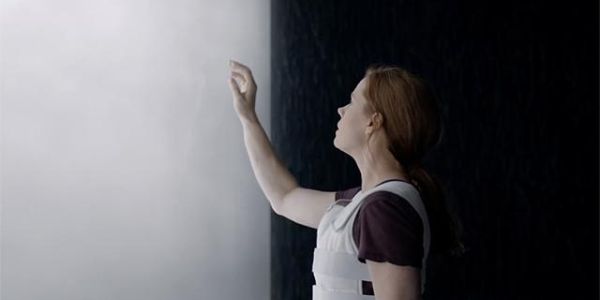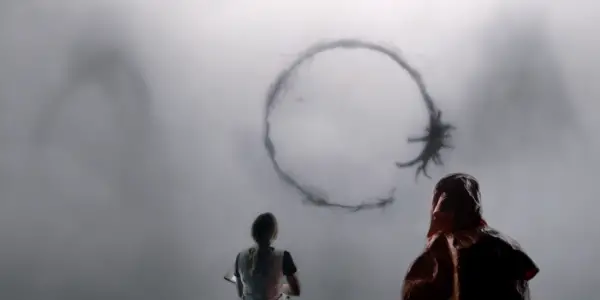ARRIVAL: A Great Watch Suffers Upon The Dichotomy Of Interpretation

A bi-product of passion and experimentation gone wrong, Mike has…
“What we’ve got here is failure to communicate.”– Cool Hand Luke
Much of the world’s problems are caused by linguistic shortcomings. Base reality is a mental construct formed out of and by conventional language. But it only goes so far. Language is a complex system of relationships that is perpetually in motion and is constantly evolving. Because of the ceaseless changes within a single language, conflict is formed in trying to create solid meanings or definitions. This is the unavoidable truth; language is the human perspective and the world we live in, and it is also our tragic undoing.
Language is a linear assembly of heterogeneous metaphors and symbols. Whether that be written from left to right, right to left, or up and down, language is bound together without knowing where or when it will end. The perfect language is one that is a circle, and that can be understood in its entire schematic relationships. What it boils down to is a matter of interpretation, itself being a variable code of linguistic schematics. To understand this concept, the best word in the English language that encompasses the idea through imagery is “palindrome.” A palindrome is a word can be read the same way frontwards and backwards. In an ideal world, the supreme and universal language would be nothing but palindromes so as to remove all confusion and doubt, and express the fullness of symbols and potential meanings.
Arrival, the sci-fi thriller about first contact with an alien race, makes no attempt to hide its conceit of language. It’s an effective and emotional film that goes full arthouse with its aesthetics. But for all the beautiful accomplishments, from the writing, to the art direction, to the haunting score, there are a few elements missing that keep Arrival stuck in basic grammatical education as opposed to transcending into a fully-formed expression of relationships.
Xenolinguistics
Taking language to task, Arrival strains all of the interwoven normalities, contradictions, schematics, and relationships in order to try and craft universal harmony. When twelve alien spacecrafts land at random points around the globe, linguistic professor Lousie Banks (Amy Adams) and theoretical physicist Ian Donnelly (Jeremy Renner) are hired by the U.S. government to find a common language to communicate with the extraterrestrial Heptapods.

Directed with an expertise that most modern filmmakers lack, French-Canadian auteur Denis Villeneuve fits good amount of intellect inside a story that is overflowing with emotional weight. It’s quite impossible to really talk about the specific accomplishments of the film, like most films, without delving into the big reveals, twists, and turns. Arrival is the fourth film by Villeneuve in three years to be executed with confidence and swagger, making Villeneuve‘s batting average a thousand.
Last year’s Sicario was a damning look at the current state of western society, exposing blood-lust corruption at the highest levels of government that is bleeding down and eroding nations from within. This year’s Arrival is the complete opposite in terms of thematics, as it acts as a wish-fulfillment of hope for the future. Perhaps nobody has produced such a juxtaposition of ideas and desires in two films since Victor Fleming made The Wizard of Oz and Gone with the Wind in the same year.
Amy Adams delivers her best performance to date (though word is she just as remarkable in the upcoming Nocturnal Animals). Louise is an understated character that has a timidity and shyness that plays well. Her backstory of tragic loss and abandonment makes her desire for connection with the massive aliens all the more cathartic. And Ian fits in nicely, as a grounded and scientific voice to all the fruity language stuff, which is about symbols and imagery.

Having previously worked with the mighty Roger Deakins as director of photography on two of his last three films, Villeneuve collaborated with Bradford Young to a mostly successful accomplishment. Nobody is Deakins, though, and Young doesn’t quite pack the wow-factor into all of his shots. Most of the film is shot well enough, but in the flashbacks the team pulls a Terrence Malick style, and employs too much hand-held cinematography. It’s lamentable, for if the film had been shot completely traditionally there would be nothing to complain about with its photographic elementals.
Villeneuve’s films are really good at being films. They are as much about the atmosphere, the feeling, and the look as they are about narrative and plot. That isn’t to say Arrival doesn’t pack an emotional right-hook, because it does. It’s one of those tremendous feats where the narrative railroads the viewers with its big twit, unfortunately to its downfall. Initially reading the execution of the filmic language, if one looks back over Arrival they’ll be able to pick up subtle nuances in the story that are being told from a different vantage point. It’s just dependent upon a different linguistic paradigm, and unfortunately that leaves much to be desired.
Cracking The Code
Based upon the short story Story of Your Life by Ted Chiang, screenwriter Eric Heisserer has crafted a film, an illusion of light, that comments back on the form of comprehending stories, which are how we comprehend language. The problem with the film is that once the big reveal is had, there is no ambiguity to it. Ambiguity is the distance in art that allows for believing and accepting entirely fake worlds and creations. The terrible term, suspension of disbelief, is exactly this; what we’re willing to agree to in falsehood and what we’re not. And with ambiguity comes the realm of the possible, or not. It makes for better fiction to have layers of ambiguity than none at all.
As has already been commented on, one can go back and find bits of dialogue that during the first watch will read completely different once the viewer has the correct knowledge. But what does this serve? That the filmmakers merely withheld the information only until the story required it be revealed, or that it is a continually eye-opening experience each time? Perhaps only a second view, for then one has killed the film’s language and the symbols have all been reduced to one stagnant meaning.
Of course, one could have a whole host of new ideas and be lead to different revelations, as with all great fiction and art. But with Arrival, there is the impossibility of gleaning anything from the story because there is nothing to be added to the piece. It is done, and all the puzzle pieces fit in perfectly. Because the film lacks the faults in language, and misses out on the importance of infinite possibilities in figurative speech, it balks on being a great movie.

The other big disappointment comes from Louise’s motivation. It is certainly emotional, but, really, how many times do we have to see a dead wife, mother, sister, or daughter be the reason the main character does or has constructed their world view? The film wants to be subversive with this trope, but like the end of the film, it means only one thing and not other possibilities.
There are a few thematic touches which help the movie, though. The film is book-ended by shots of massive bodies of water, and this plays into the quest to kill the unknowable, most beautifully done in Moby Dick. Anytime there’s a body of water in art, this is almost always in reference to “the ungraspable phantom of life.” And with that comes liberation of images and sounds about the mental subconscious, and the vast oceanic recess of the human mind. To kill it, stop a Kinect system in its progress is to find peace and harmony in circular fashion. But to do so comes at the cost of removing liberating variables, and reducing relational complexities down to confining, homogeneous representations.
Summation
Arrival shows up where the crowds would expect it to, in the emotional department. But upon further analysis, the film lacks the wit or width for uncertainty, and it has only one dimension to offer as entertainment. Though well made and haunted by a score of primordial dissonance, Arrival is an orbiting piece that misses out on invading the deepest parts of the mind.
What did you make of the big reveal in Arrival?
Arrival is in theaters in the U.S. and U.K. Find international release dates here.
Does content like this matter to you?
Become a Member and support film journalism. Unlock access to all of Film Inquiry`s great articles. Join a community of like-minded readers who are passionate about cinema - get access to our private members Network, give back to independent filmmakers, and more.
A bi-product of passion and experimentation gone wrong, Mike has spent most of his time in the field couch surfing and growing a comb-over. Several of his favorite films are Rashomon, Vertigo, Apocalypse Now, and The Naked Gun.












